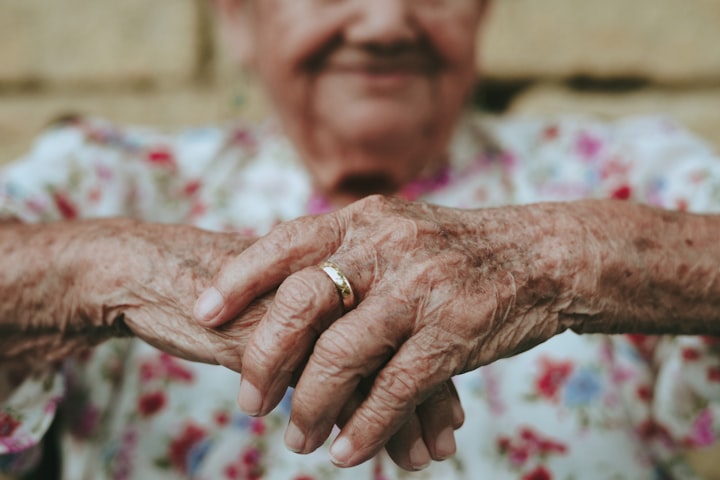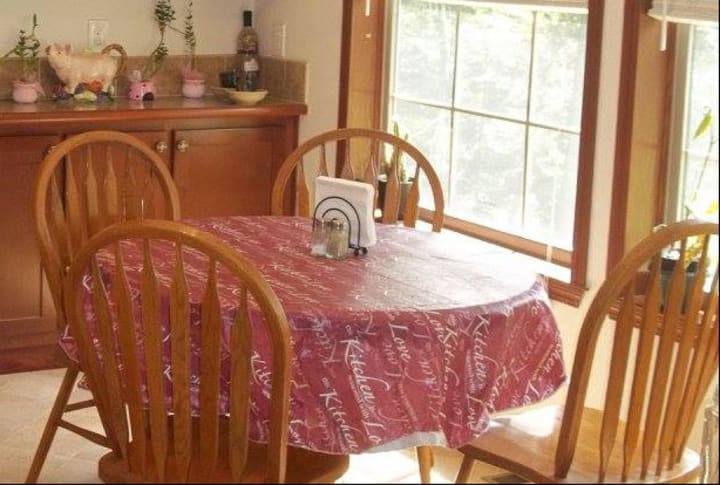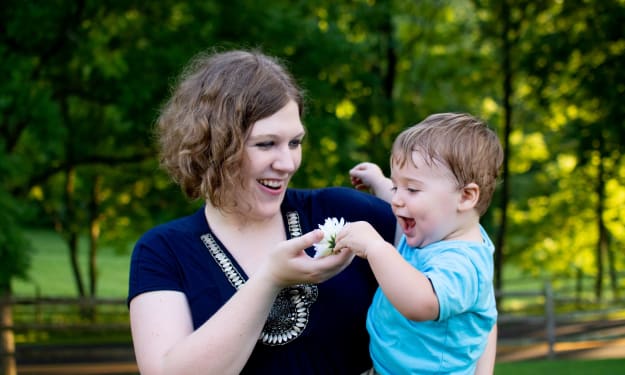What Made Great-Grandma Great
Wisdom Earned by Years of Appalachian Culture

I've often wondered about my great-grandma. She survived the depression, many economic downturns, various children, and the death of her husband. Her stubbornness and willpower is unmatched by many. Aside from one exception that came slightly close, I have yet to witness any others that can compare to her in that regard. Living like that was just the way it was I suppose. You had to be hard, tough, and resilient to get along and live in this world back then.
I remember when I was younger I always founder her insistence on independence and appreciation of the ordinary strange. She was quite fond of the home she had built, though it was nothing much to look at. Summers were hot without air conditioning, but she didn't complain. Her guests too often did that for her. She was always telling some story or talking about her departed husband who left her. It wasn't as if he wanted to die, but she was clearly lonely and mad at him for leaving her behind. She wanted him to have been tougher and stronger, but she would eventually end her rant with the conclusion that "God took him." It didn't make it any easier for her, but it was obvious she realized the truth; her husband had no say in when he departed this world. She just didn't want to openly accept it, and that was the way she verbalized it.
Her husband, as independent as she was, was very dear to her. She loved him very much, despite what anger she verbalized at him for his passing. I never met the man, but I heard about his "never minded for nothin' attitude." He was always making wise-cracks or jokes about something, and he rarely took anything seriously. Despite this, he was a hard-worker and good provider to his family. It seemed he always gave them the best of him, and that didn't just mean materially. He was a "good husband" and a "good father." he found a way to meet his family's needs even when they were terribly poor. He believed in having a sense of humor about things. It was hard to get through this life without one. His large ears and wide smile I'd seen in pictures only added to the personality I was told he had. He was tall and lanky, probably from working to the bone, but I hadn't seen a picture of him where he didn't seem happy. In the pictures my great-grandma and him were in together, I noticed they both appeared happy. They lived. They went to family get-togethers and functions, and were excited to welcome new family members. They went to ice cream socials, dances, revivals, dinners, and other various functions at church.

(It was actually upon Great-Grandma's insistence that I attended an ice cream social with the rest of my family and had the best homemade ice cream to date!)
Their faith in "the Lord" was far different from what I've seen in my lifetime, and I don't mean that in a bad way. "God's grace and loving your neighbor" meant something different in those times than it does today. They had struggles, but they were also part of a generation that cared for each other, a community. There were many times where you had to lean on each other. If your neighbor was without, you gave any excess you had to them. Your neighbor that was without one week ago may be providing to your family with their excess the next week. You cared, loved, and helped each other in order to survive. It was their culture and way of life to do such. Churches aren't dying today because of young people, they are dying because this type of community has dwindled and ceased to exist for some time. This culture isn't something that can be shaped or enforced by governments or entities; it must come from each genuine human heart with love , and that isn't the easiest thing to teach or learn.

Still, there were times neighbors didn't always get along and amends had to be made. I always thought my great-grandma's walking to school story was funny. One neighbor had a billy goat that was always getting out of the fence. The goat would follow my great-grandma to school head-butting her backside on the way there. She told their neighbor, but he didn't seem overly concerned. My great-grandma was maybe eight years old at the time, and was largely written off. Finally, she had enough and gave her neighbor one last chance. "If that billy goat butts me again, I'm going to kill it." she told him. The neighbor laughed heartily.
The next day, he wasn't laughing when she drug the deceased goat to him after school. "I believe this goat belongs to you. I told you if this billy goat head-butted me again, I was going to kill it, so here it is." she said with smug confidence. The neighbor couldn't believe this little eight-year-old girl who was little more than skin and bone had indeed killed his billy goat. At first, he was angry thinking her parents must have done it, but after speaking to them he found out otherwise. Her parents didn't know anything about it, but asked in front of their neighbor how she managed to kill the goat.

She responded as confidently as she informed the neighbor of his goat's departure from this world, "I beat it in the head with a rock until it was dead. I was so mad at that darned goat for head-butting me every day!"
It was true, Great-Grandma had killed the billy goat in that manner. His head had been smashed in. I don't know if you've ever felt a goat's head, but they are incredibly hard. It would have taken a lot of hard will and determination to kill a billy goat by beating it in the head with a rock, especially for a tiny eight-year-old girl. Those same characteristics were the very things it took for her to grow up in those times. Do you want to know the surprising thing about this incident?
The neighbor and owner of the goat was held accountable for his poor management of his livestock. He took responsibility for the loss of his goat because he did not contain him properly! Isn't that a turn of events?! He harbored no ill will against my great-grandma's family, and ensured he kept his livestock properly from thereafter.
I enjoyed that story every time I heard it, which was nearly every visit. It seemed bewildering and unfathomable compared to the times I was growing up in. Honestly, I thought my great-grandma grew up in a situation similar to the Wild West. It also made me feel that somehow, this story was one of female empowerment. She wasn't just some helpless little girl, dame, or damsel in distress. She knew how to fight back and stand up for herself, and she wasn't a bit shy about it either! I liked and respected her for that! She was a "tough-old-bird" regardless of how weak she might have appeared on the outside, and she always had more stories of life experiences and lessons that I could scarcely comprehend.
My great-grandma also piqued my curiosity and interest. She said peculiar things like needing new "pillars." I thought this was amusing in my child-like ignorance and arrogance. "Pillars for a trailer?!" I scoffed and asked my mother. I thought I was well versed in Greek history and architecture from books I had read and wanted to show off. If I could smack my younger self, I would.
She means "pillows" my mother corrected, and explained that my great-grandma just talks funny. "Schools didn't teach grammar the same way back then as they do now." she informed, and continued.

What I concluded based on that information was that my great-grandmother must have been an uneducated hillbilly, but I would learn later that was incorrect.
Her memory and focus even into her nineties was impeccable and precise. She was nearly scholarly in biblical knowledge, classic literature, and how to get through a cold winter. Sure, she always said she needed to make a "far" instead of a fire, but she always managed to survive with less than what the majority of people thought they needed.
She spoke differently. Her wording and phrasing still needed some translating for me to understand, but it didn't take long to realize despite how her usage of language came off that she was an intelligent and well-educated woman for her years. She quoted works she went over in her young school years some seventy to eighty years prior on various occasions. I did well to remember what was on last week's test. People like my great-grandmother were underestimated or written off on bias and surface level impressions, but so much could have been learned from them.
Appreciation was one of the number one traits their generation knew, and honestly I had little perception of it. My family bought a new kitchen table, and gave her the old round maple one we had before. She always talked proudly about the table to everyone every visit afterward stating it was "the nicest piece of furniture she had ever owned." Many of us looked at her quizzically when she mentioned it. Personally, I had always found it an ugly and simple piece. I preferred mahogany or cherry woodwork with intricate scrollwork, so I completely ignored and disregarded the craftsmanship of this simple maple table. My parents did also; it was meaningless to us. My parents just wanted it out of our house to make space for a new one, but to my great-grandma it was obviously so much more. She treasured and adored it, and cleaned and polished it frequently.

In her later years, she insisted that she wanted to remain independent. She was going to pass at home, and that was final. A caregiver checked in on her a couple times a week, but Great-Grandma was stubbornly determined and insistent to do as much as possible on her own. Her wish was granted and she passed away not just in the comfort of her own home, but with her arms folded and head resting on that same table she adored.
Some may find it macabre, but I find something beautifully romantic and magical about the way she passed. In my eyes, she passed away on her terms; where she wanted to pass, and on the very piece she treasured. She had prayed to "God" to take her for some time, ever since Great-Grandpa had passed away. She couldn't understand "what "the Lord" was keepin' her around fer' all this time." She "reckoned there must be something more she was meant to do, but that didn't mean she wasn't gonna beg him to take her."
I always felt morose that she missed my great-grandpa so much and felt so lonely that she prayed and begged "God" to take her away. When she finally passed the way she did, I was happy and maybe even excited for her. It was a kind way to pass with many of the desires she wanted, and I was glad she could rest in peace accordingly since she had wanted it for so long.

Great-grandma was the person who confused me most as a child. I listened to my mother and grandmother talk about how poor she was, and how she should or shouldn't be spending or, more accurately, giving away the money she did have, but they couldn't keep her from it. Comments like, "she doesn't need to do this or that" were made when her children, grandchildren, and great-grandchildren received Christmas cards with different amounts of cash in them each year. Other comments frequently made were "why does she even bother to send a card for that amount of money?"

For some reason, I always felt bad hearing those comments. I felt guilty for receiving money and the card. I wanted to give it back to her since "everyone thought" she needed the money more than any of us. Thankfully, I was told, "No, it will offend her if you offer to give it back. That is how she is, and we can't get her to stop. You might as well accept it, and thank her for it." I can't recall which relative instructed me to do so, but I was glad they did. Up until the year she died, I received a card with money in it as her great-grandchild. The amount had decreased over the years from $5 to $2, and eventually a single dollar to her great-great-grandchildren. I didn't care about the amount. In fact, it was never about the amount. I thought of how tough it must be to give money to all of her children, grandchildren, great-grandchildren, and now great-great grandchildren. I didn't even know how many of us there were for her. I couldn't name them, couldn't count them accurately, and had no clue, yet every year she sent cards with money for EACH of us on her lower fixed income. I thought "She must have had to save all year for this.", and she did. While $1-$2 might not have seemed that much to some of the commenters, it was worth so much more than just its monetary value. It was a full year of savings that she could have spent on making her own life a small amount more comfortable, but she instead chose to give it as an extension of her love for us.
As an adult, I cannot critique, but instead admire and appreciate this behavior. Part of me wonders if in some way, she felt she was even extending our great-grandfather's love after his passing since part of the income she lived on was based on his previous earnings. Regardless of whether that was part of her intention or not, I know that my great-grandmother always gave with a loving heart. In her later years, she didn't merely think of herself. She cared for many, and she wanted to extend that love to others. Love, strength, kindness, wisdom, gratitude, and humility are what made my great-grandmother great.

About the Creator
E.L. Martin
Powered by Nature, Humanity, Humor, Food, Lifestyle, Fiction, and Culture; Oh, and a questionable amount of coffee.






Comments
There are no comments for this story
Be the first to respond and start the conversation.